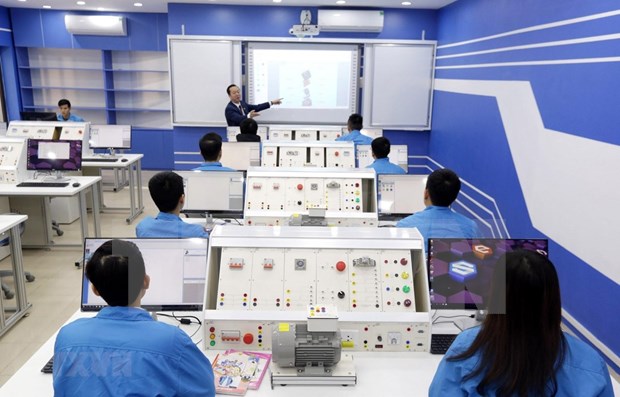Future of jobs: started from 4.0 vocational training
 Robotization and automation will change the job market. (Illustrative image: VNA)
Robotization and automation will change the job market. (Illustrative image: VNA)Hanoi (VNA) - To catch up with the changes of the world of the 4.0 jobs, workers must acquire the sill of unceasing learning a flexible vocational training system.
Technology can liberalize labourers from physically hard and dangerous jobs. The digital technology is bringing in chances to improve the safety of the jobs but, at the same time, also creating very huge hurdles for the workers as it is changing the job positions and requiring new skills.
Discussing the technology and the future of the jobs in Vietnam, one cannot fail to touch upon the automation in which machines will replace human being. The challenges in retraining skills for workers to make them able to adapt themselves to the changes in the labour market in the context of the Fourth Industrial Revolution are becoming bigger.
And, it is now high time for the vocational training to make really comprehensive reforms.
According to forecasts by international organizations, about 75 percent of the workforce in Vietnam is influenced by the Fourth Industrial Revolution. As a result, the workers will have to acquire the skills to become adaptable to the constant changes of the market as millions of jobs will be taken by robots, and new jobs with new requirements come into being.
“Fight” between human being and robots
Experts hold that the Fourth Industrial Revolution will change the nature of the jobs in the future. However, the strongest influence is not necessarily the jobs of jobs but the changes in the requirements of the jobs.
Pham Do Nhat Tien, former Assistant to the Minister of Education and Training, held that as integration impacts the labour market in the direction of bringing to this market an international measurement, the Fourth Industrial Revolution has a much stronger influence: it makes the labour market move to a new stage of development and forms a 4.0 world of jobs.
In the 4.0 world of jobs, human being will compete with robots in a working environment of digitization and automation. In this competition, robots will replace the human being in a series of jobs of repeats, brain or manual work. But it is thanks to the liberalization from the boring work, the human being will be able and have to bring into full play their potential to overcome the robots, Tien said.
A report by the Navigos Group on the prospects and tendencies of skill in Vietnam in the 2018-2022 perod, 42 percent of the experts hold that robots will replace the human being in the job groups of repeat such as administrative and secretariat work. Although it was still among the top three of greatest demand in 2018, it is forecast to experience a fall in the five years to come as machines will take its toll.
 Employers will change their requirement on skills (Illustrative image: VietnamPlus)
Employers will change their requirement on skills (Illustrative image: VietnamPlus)The scientific and technological factors that will change the labour market in the five years to come are nothing but robotization and automation. Engineers and technicians of high skills are those who enjoy the prospect of strongest development in the five years to come.
Learn so as to respond
With a total labour force of nearly 56 million workhands, Vietnam is enjoying a considerable advantage in attracting foreign investment. Trained workers in Vietnam occupy only more than 60 percent of the total workforce and, as a result, entering the fourth Industrial Revolution, they will encounter very huge challenge in adaptability to the changes in the labour market.
According to Valentina Barcucci from the Vietnam office of the International Labor Organization (ILO), many challenges in stable jobs in the labour market of Vietnam will be overcome with skills. In her opinion, the “compass” to orient the occupational skill system is investment to human resources in the direction of supporting the shift and the lifelong learning.
For her part, high-level economist Wendy Cunningham of the World Bank stressed that in the future, labourers still need training to meet the demand for higher skills. Among the 10 jobs forecast to have rapid development in Vietnam, six need training for workers.

Employers give higher priority to digitization skills. (Illustrative image: VNA)
According to Tien, concrete occupational skills are not enough for workers, they still need broader skills, including basic ones to respond to the changes and those that cannot be mathematized such as contacting, cooperating, critical thinking, creativity, curiousness, persistence and foregiveness./.













